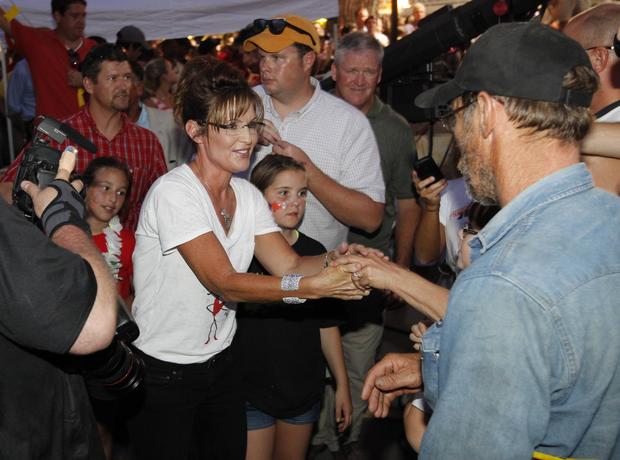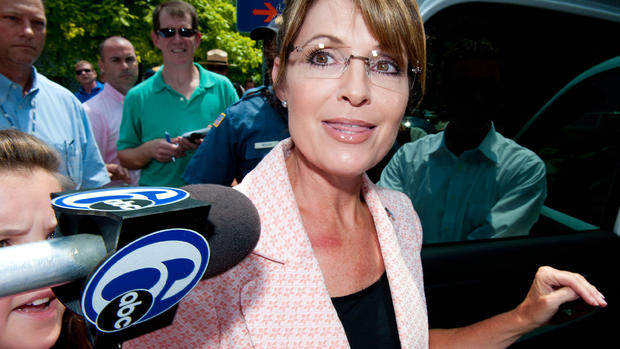Could a Palin presidential bid rewrite the campaign rulebook?
Updated 9 a.m. ET
Conventional wisdom dictates that Sarah Palin is not running for president: it's too late; the field is too crowded, and many think she is more interested in making money than running for office.
On top of that, the onetime vice presidential candidate has failed to build substantial campaign apparatus in crucial early primary states. She has seemingly declined to aggressively court big-name, big-dollar Republican donors, and she has watched as countless top GOP operatives join her possible competitors' campaigns.
Palin, many believe, has handicapped her own prospects for 2012 and decided to sit it out.
"Like everyone else, I have assumed she wouldn't run because, despite what she keeps saying, it is late to organize a successful bid," says political analyst Larry Sabato, director of University of Virginia's Center for Politics. "Many of the people who might have backed her earlier have moved on to Perry or Bachmann, and possibly others."
"At some level, I think Palin has realized that her negatives are just too high to win the White House, certainly in the 2012 campaign," he adds.
But that may be like a lot of other conventional wisdom: wrong.
At least one high-profile pundit thinks so. Karl Rove, the former strategist for George W. Bush, said Sunday he thinks the odds favor a Palin run.
Pointing to a campaign-style video Palin released last week, Rove told Fox News Sunday he'd put his money where his mouth is.
"I'm not much of a gambler, but I'd put a little bit more money that she gets in than she doesn't," Rove said. Of her upcoming schedule in Iowa, which includes a Tea Party speaking event on September 3, Rove said it "looks like that of a candidate, not a celebrity."
Rove anticipates a swift announcement. "You can only tease so many times in the political process and I think she's getting to the end of that," he said. (Late Monday, Palin's SarahPAC denied a decision was imminent and said comments otherwise were "intended to mislead the American public.")
In an appearance on CBS' "Face the Nation" Sunday, Sen. John McCain, R-Ariz., Palin's 2008 presidential running mate, said he didn't know whether or not Palin would run - but he said he thought she would be a "formidable" candidate if she did.
McCain: Palin would be "formidable" in 2012
Sarah Palin releases campaign-style video about Iowa trip
And Palin has certainly been keeping herself busy. Over the past several months, she has participated in and embraced and a pro-Sarah Palin documentary that glorifies her half-term tenure as Alaska governor; she has launched the "One Nation" bus tour which, while only sporadically deployed, has made some strategically-timed stops - most recently at the Iowa State Fair, where the majority of the GOP field was preparing for the following day's closely-watched Iowa straw poll; and she has made efforts to maintain her place in political discourse by publicly commenting on the political debates of the day - albeit through her preferred venues of Facebook and Fox News. (Notably, if she did enter the race, Palin would have to give up her lucrative Fox News contract - another possible disincentive.)
"Her campaign, if it is a campaign, just truly baffles me," says Republican strategist Eric Woolson, who managed former Arkansas governor Mike Huckabee's Iowa campaign in 2008 and worked on former Minnesota Governor Tim Pawlenty's 2012 bid until his recent withdrawal from the race. "She's not doing interviews; she really doesn't have the infrastructure around her that she would have typically set up by this point of the game... All of us would say, gosh, she should have had that infrastructure in place two years ago."
Palin herself has said on multiple occasions that any campaign she might run would like unlike that of an establishment candidate.
"Each campaign that I have ever run in these 20 years of elective office have been kind of unconventional, right, Todd?" Palin told reporters at the Iowa state fair. "We've always been outspent, two-to-one, five-to-one, ten-to-one. Never won any polls heading into election night. But usually won the election. So it would be unconventional and very grass roots."
"And I wouldn't be out there looking for hires out of that political bubble that seemed to result in the same old ideas, the same old talking points, the things that Americans get so sick and tired of hearing and kind of suffering through," she added. "We want new energy, we want conviction and passion and candidness."
If Palin's recent activities are indeed part of some larger "unconventional" campaign strategy, Woolson says she could potentially rewrite the rulebook on how politicians run for president.
"We're always fighting this war based on the last war," Woolson says. "I think one of the lessons with Governor Pawlenty [was that] this isn't the kind of year where somebody with his resume of experiences and results ... is what voters are looking for."
"This year just seems so different than any other year," he added. "It's certainly the strangest year that I've seen in quite some time."
Latest leg of Palin bus tour wraps up after four days
Sarah Palin defends Michele Bachmann, jabs Rick Perry
The relative success thus far of Rep. Michele Bachmann, R-Minn., a two-term Minnesota congresswoman, seems to speak to his point: A staunch conservative with deep religious ties and relatively little experience on the national stage, Bachmann quickly outpaced more mainstream candidates like Pawlenty, who withdrew in August after failing to gain significant traction at the Iowa straw poll. Many attributed Pawlenty's failure not to his record but to what was widely perceived as a lack of charisma.
Conversely, some think that Palin's star power, mixed with her savvy in new media and grassroots networking, could give her the leverage she needs to run a viable - if unorthodox -campaign.
"She's got a knack for drawing attention to herself and getting terrific amount of media coverage," Woolson says. "If that spotlight is somewhere else, I think she just has a real ability to be able to draw the media and voters' attention back to her again."
Woolson pointed to Palin's "One Nation" tour stop in Iowa, where, despite neither being on the straw poll ballot nor participating in the Republican debate, the former governor soaked up more than her due of attention, holding court with reporters for hours and diverting attention from her fellow Republicans.
"She proved that she could do it with Romney, she proved that she could do it with the entire Republican field last weekend," Woolson says, referring to the previous leg Palin's bus tour, which coincided with Former Massachusetts Gov. Mitt Romney's campaign announcement in New Hamphire. "That ability to capture a moment - she is masterful at those sorts of things."
Of course, how far one's ability to "capture a moment" can take a candidate in a presidential campaign is unknown. Palin would undoubtedly be paving new ground in the realm of fundraising - and she would have to all but forgo the support of the Republican establishment.
"Republicans understand that Palin would be a very controversial nominee," Sabato says. "They are focused on defeating President Obama, and most probably don't want to take a chance on throwing that opportunity away."
Many strategists, however, believe that if Palin did run, bucking the establishment would be one of the organizing themes of her campaign. The expectation is that she would use her grassroots organizing prowess to develop her own channels and form a whole new sort of army on the ground. Maintaining conventional GOP contacts, therefore, may not be on the forefront of her mind in the decision-making process.
No one, however, is willing to bet on whether or not those channels might be sufficient to win the Republican nomination, particularly when the field is so crowded to begin with. Candidates like Texas Governor Rick Perry and Michele Bachmann, both of whom are powerful fundraisers with strong Tea Party credentials, are potentially already tapping into Palin-friendly voters.
"Every time I think I have things figured out, I really don't," says Woolson. "[Palin] may have absolutely the right approach - we may not know that for months. You never know if a non-traditional approach is going to succeed or fail until it actually does."
"You never rule out somebody like Palin in a fractured field," Sabato adds. "She has a devoted following. And there's nothing in the rulebook that says an unconventional campaign can't work in a year like this one."
Ultimately, Woolson says, the success or failure of a Palin candidacy would boil down to the question that's on everyone's lips: "Is she crazy like a fox, or just crazy?"
Woolson adds: "I mean that in a campaign sense, at least."

